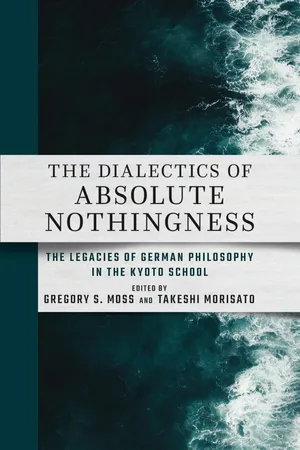
The Dialectics of Absolute Nothingness
The Legacies of German Philosophy in the Kyoto School
- 324 pages
- English
- ePUB (mobile friendly)
- Available on iOS & Android
The Dialectics of Absolute Nothingness
The Legacies of German Philosophy in the Kyoto School
About this book
The Dialectics of Absolute Nothingness investigates the appropriations, critiques, and innovative interpretations of German philosophy by the Kyoto School, showing how central concepts of German philosophical traditions found a place within non-Western frameworks such as Zen and Pure Land Buddhism, thereby transcending the original Western context.
Kyoto School philosophers critically engaged with their own tradition and grappled with classical German philosophy from Kant to German Idealism and from Neo-Kantianism to German phenomenology. Far from mimicking the Western tradition, Nishida, Tanabe, Nishitani and other Japanese philosophers overcame their sense of alienation from European philosophy by making its concepts their own and advancing their ideas as a hybrid of European and Japanese philosophy through which they developed their own world historical perspective.
Showcasing the ways that Kyoto School philosophers internalized German philosophy and generated their own original perspectives, The Dialectics of Absolute Nothingness demonstrates the Kyoto School's potential for culturally diversifying the study of German philosophy and paves the way for the comprehensive study of Asian philosophy in European and global contexts.
Frequently asked questions
- Essential is ideal for learners and professionals who enjoy exploring a wide range of subjects. Access the Essential Library with 800,000+ trusted titles and best-sellers across business, personal growth, and the humanities. Includes unlimited reading time and Standard Read Aloud voice.
- Complete: Perfect for advanced learners and researchers needing full, unrestricted access. Unlock 1.4M+ books across hundreds of subjects, including academic and specialized titles. The Complete Plan also includes advanced features like Premium Read Aloud and Research Assistant.
Please note we cannot support devices running on iOS 13 and Android 7 or earlier. Learn more about using the app.
Information
Table of contents
- Introduction
- Part I: The Foundation of the Kyoto School: Nishida and Tanabe
- Part II: The Critical Evolution of the Kyoto School: Nishitani and Ueda
- Part III: At the Margins of the Kyoto School: Kuki, Kimura, Watsuji, Mori, and Doi
- Index